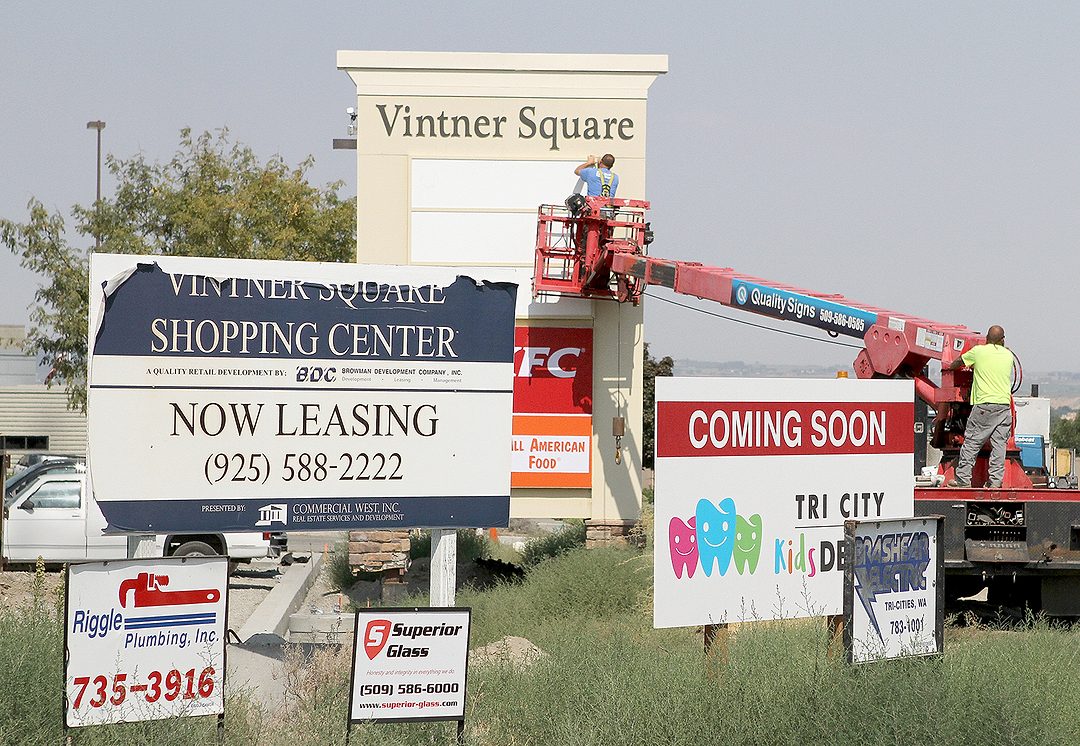
Home » Richland eyes local, international developments
Richland eyes local, international developments

May 6, 2018
The city of Richland continues to experience residential, commercial and industrial growth, with additional homes and businesses to pop up in 2018.
“Beginning in 2016 and continuing through this year, Lamb Weston’s expansion continues to be our biggest project. Lamb Weston is a great partner with the city, and its expansion increases our job market and manufacturing base,” said N. Zach Ratkai, the city’s economic development manager.
The $200 million french fry processing line will bring 162 jobs to the area. The expansion is just shy of 280,000 square feet. Construction began in June 2016, and Ratkai said it should be completed and operational by December 2017.
Lamb Weston is one of the largest employers in the Columbia Basin, with about 4,500 employees.
In addition to Lamb Weston, the city’s other big commercial projects include Cost Less Carpet, which expanded its store along Highway 240 near the Reach museum. The 62,000-square-foot expansion includes a $5.5 million distribution center and corporate office.
The city of Richland broke ground in September on its new $18.5 million city hall, which will be “an exciting addition to the Swift Boulevard corridor downtown,” Ratkai said.
The city plans to demolish the 59-year-old city hall on George Washington Way and sell the land for commercial development.
The new three-story, 40,840-square-foot building will include a 3,345-square-foot basement to house records. It should be complete in 2019.
Richland, population 54,150, grew by 1.3 percent from last year. The city welcomed 15,442 people between 2000-17, growing nearly 40 percent.
Richland saw significant increases in commercial construction permits issued from 2016-17. New commercial construction building permits numbered 45, valued at $52.17 million, from January through July this year, up nine permits from the same period last year, though last year’s valuation totaled $94.53 million.

Existing commercial construction permits increased by more than a third for the first six months of 2017 when compared to 2016. The existing construction permits had a value of $14.83 million through the end of July, compared to $7.41 million in 2016.
“Last year had permit charges for the Preferred Freezer facility levied, which were high priced due to the size; however, without such a large project thus far in 2017, permit values have normalized,” Ratkai said.
Preferred Freezer Services opened a $115 million facility in July 2015 in the north part of Richland to provide refrigerated warehousing services.
Ratkai said the increase in the number of permits issued for all sectors can be attributed to the strong economy nationwide that “allows new businesses to start, expand or relocate.”
“The same could be said for home permits. More land has opened up for development and more people are moving into new homes in Richland,” he said.
The city’s residential building permits have remained steady, with a slight increase during the first six months of the year, compared to the same time last year. The number of new single-family home permits jumped from 146 to 153 from January through July, though valuation dropped a bit, from $49.12 million to $46.28 million for the same period last year.
The city’s residential outlook remains positive, Ratkai said.
“As the inventory of homes for sale remains tight, new construction will always be robust,” he said.
The city of Richland currently has 2,100 acres of land available for development in the Horn Rapids Industrial Park and the Horn Rapids Business Center in north Richland.
“Horn Rapids is the premier location in Central Washington for industrial, manufacturing and trade. This vital area of Richland continues to develop at a steady pace, with land sales exceeding $1.5 million in 2017, most notably of which was 40 acres of land being sold to the Washington National Guard,” Ratkai said.
The National Guard had hoped to speed the completion date to 2019 for a 40,000-square-foot center for an Army infantry Stryker company with 180 to 200 people, 16 Strykers, plus support vehicles, but the $300,000 needed for design work is in the stalled state capital budget. The finish date now appears to be headed back to 2020, according to Washington National Guard officials.
Although plans and bids are still not tackled, the National Guard expects the project to cost about $3.8 million in state capital funds, which are needed to receive another $11.4 million in federal money.
Next year’s economic outlook is strong for Richland, Ratkai said.
“For 2018, the city has eight prospects for land purchases in the works and is working to further market Horn Rapids for development in large-scale manufacturing, logistics, international trade hubs and support facilities,” he said. “Expect big things to happen in Horn Rapids in 2018.”
Another area that experiences high traffic volume is the ever-growing Queensgate corridor, a growing retail hub for the Mid-Columbia.
“Richland has seen a lot of success with new establishments such as Ross, Marshalls, MOD Pizza and Mattress Firm,” Ratkai said. The Tri-Cities’ first-ever Panera Bread soon will open in the Queensgate corridor.
“We are lucky here to have so much opportunity and a well-balanced economy to provide jobs, homes and shopping to the region,” he said. “Richland is positioned to continue this growth in 2018 and beyond, with continued development interest not only rooted locally, but internationally as well.”
Construction + Real Estate
KEYWORDS focus real estate construction 2017




